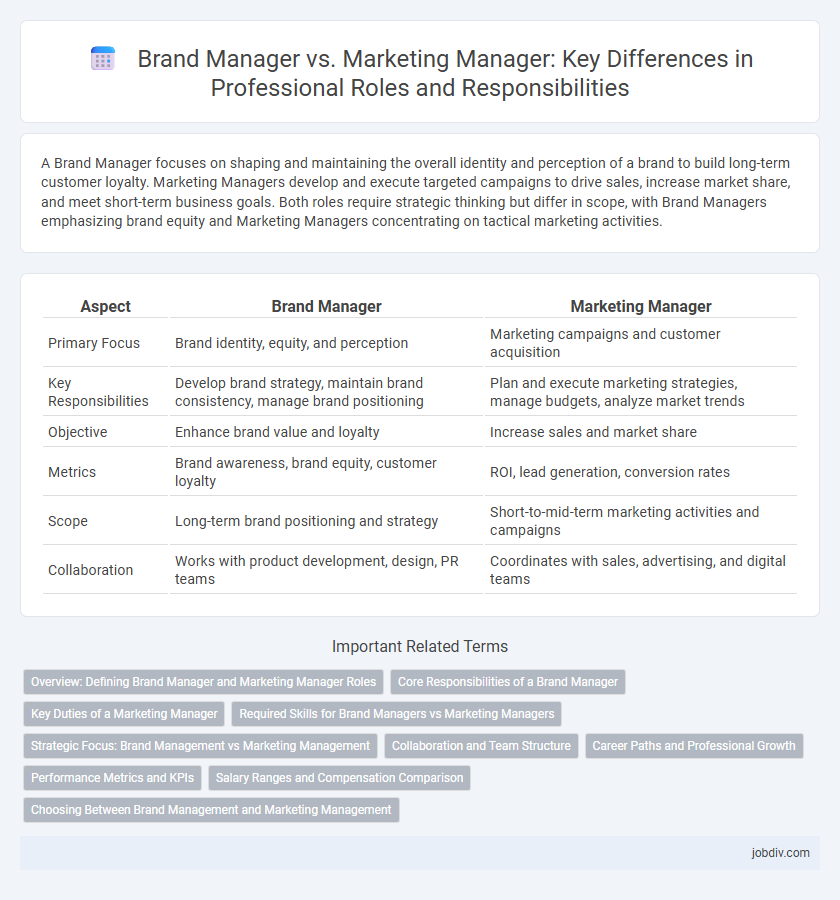A Brand Manager focuses on shaping and maintaining the overall identity and perception of a brand to build long-term customer loyalty. Marketing Managers develop and execute targeted campaigns to drive sales, increase market share, and meet short-term business goals. Both roles require strategic thinking but differ in scope, with Brand Managers emphasizing brand equity and Marketing Managers concentrating on tactical marketing activities.
Table of Comparison
| Aspect | Brand Manager | Marketing Manager |
|---|---|---|
| Primary Focus | Brand identity, equity, and perception | Marketing campaigns and customer acquisition |
| Key Responsibilities | Develop brand strategy, maintain brand consistency, manage brand positioning | Plan and execute marketing strategies, manage budgets, analyze market trends |
| Objective | Enhance brand value and loyalty | Increase sales and market share |
| Metrics | Brand awareness, brand equity, customer loyalty | ROI, lead generation, conversion rates |
| Scope | Long-term brand positioning and strategy | Short-to-mid-term marketing activities and campaigns |
| Collaboration | Works with product development, design, PR teams | Coordinates with sales, advertising, and digital teams |
Overview: Defining Brand Manager and Marketing Manager Roles
Brand Managers focus on shaping and maintaining a brand's identity, ensuring consistency across all customer touchpoints to build long-term loyalty. Marketing Managers develop and implement comprehensive marketing strategies, targeting market growth, customer acquisition, and sales performance. Both roles require cross-functional collaboration, but Brand Managers emphasize brand equity while Marketing Managers prioritize campaign execution and market analysis.
Core Responsibilities of a Brand Manager
A Brand Manager oversees the development and execution of brand strategies to enhance market positioning and customer perception, ensuring consistent messaging across all channels. They conduct market research and analyze consumer insights to drive brand growth and maintain competitive advantage. Collaboration with product development, advertising, and sales teams is essential to align brand identity with business objectives.
Key Duties of a Marketing Manager
A Marketing Manager spearheads market research, campaign development, and performance analysis to drive brand awareness and sales growth. They collaborate with cross-functional teams to strategize product positioning, pricing, and promotional activities tailored to target audiences. Effective budget management and monitoring key performance indicators (KPIs) ensure marketing objectives align with overall business goals.
Required Skills for Brand Managers vs Marketing Managers
Brand Managers require strong expertise in brand positioning, consumer behavior analysis, and strategic communication to maintain brand identity and loyalty. Marketing Managers need proficiency in market research, campaign management, digital marketing tactics, and performance analytics to drive demand generation and sales growth. Both roles demand excellent project management, cross-functional collaboration, and data-driven decision-making skills.
Strategic Focus: Brand Management vs Marketing Management
Brand managers concentrate on shaping and maintaining a brand's identity, ensuring consistent messaging and emotional connection across all touchpoints to build long-term brand equity. Marketing managers focus on developing and executing comprehensive marketing campaigns, targeting customer acquisition, engagement, and sales growth through market research, advertising, and promotional strategies. The strategic focus of brand management revolves around brand positioning and perception, while marketing management prioritizes tactical execution and measurable market performance.
Collaboration and Team Structure
Brand Managers and Marketing Managers collaborate closely to align brand strategy with marketing campaigns, ensuring cohesive messaging across all channels. Brand Managers focus on maintaining brand identity and value, while Marketing Managers handle campaign execution and market analysis within cross-functional teams. Effective collaboration within a structured team environment enhances brand consistency and drives measurable business growth.
Career Paths and Professional Growth
Brand Managers typically concentrate on strategic brand development and positioning, driving long-term brand equity and consumer loyalty. Marketing Managers focus on executing marketing campaigns, managing budgets, and coordinating cross-functional teams to meet sales targets. Career growth for Brand Managers often leads to roles such as Director of Brand or Chief Marketing Officer, while Marketing Managers may advance to Senior Marketing Manager or Marketing Director positions with broader operational responsibilities.
Performance Metrics and KPIs
Brand Managers primarily focus on metrics such as brand awareness, brand equity, and customer loyalty, measuring the long-term impact of branding strategies on market perception and customer retention. Marketing Managers prioritize performance indicators including lead generation, conversion rates, customer acquisition cost (CAC), and return on marketing investment (ROMI), which directly relate to campaign effectiveness and sales growth. Both roles utilize data analytics tools to track these KPIs, but Brand Managers emphasize qualitative brand strength metrics while Marketing Managers concentrate on quantitative sales-driven outcomes.
Salary Ranges and Compensation Comparison
Brand Managers typically earn between $70,000 and $120,000 annually, reflecting responsibilities in product positioning and brand strategy, while Marketing Managers command salaries ranging from $75,000 to $130,000 due to broader roles in campaign management and market analysis. Compensation packages for both positions often include bonuses, profit sharing, and stock options, with Marketing Managers generally receiving higher variable pay driven by performance metrics. Geographic location, industry sector, and company size significantly influence salary disparities between Brand Managers and Marketing Managers.
Choosing Between Brand Management and Marketing Management
Brand Managers focus on shaping and maintaining a brand's identity, ensuring consistent messaging across all platforms to build customer loyalty and long-term brand equity. Marketing Managers develop and execute campaigns aimed at driving sales growth and market share, often analyzing market trends and consumer behavior to optimize marketing strategies. Choosing between brand management and marketing management depends on whether you prefer strategic brand positioning or tactical market-driven campaign execution.
Brand Manager vs Marketing Manager Infographic

 jobdiv.com
jobdiv.com